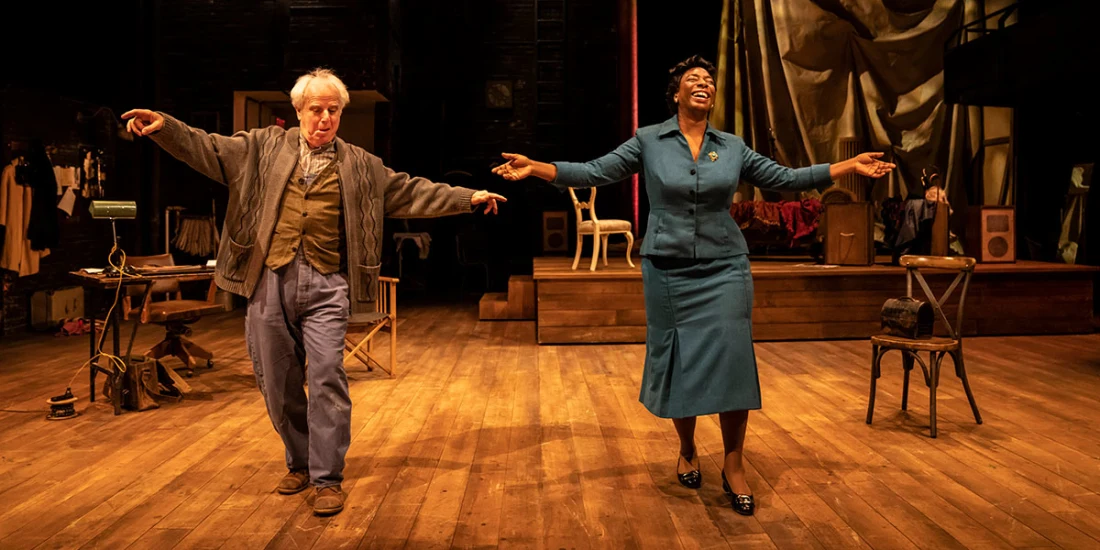'Trouble in Mind' at the National Theatre review — an engaging and stirring piece of activist theatre
Set in 1950s America, Trouble in Mind follows rehearsals for the fictional play, Chaos in Belleville; a Broadway-bound show about a lynching in a southern town. Despite being a "race" play, the show is written, financed and directed by a roster of white theatremakers.
The play-within-a-play format has been used multiple times on stage with hits such as Noises Off, Curtains, and The Play that Goes Wrong to name a few. While these other comedies seek to entertain, Trouble in Mind succeeds in using this format to reveal the grave realities of being a Black performer in a Broadway production and the wider racial inequalities within the theatre industry.
Wiletta Mayer (Tanya Moodie), our protagonist, is a larger than life African-American actress in her 40s and is cast as a one-dimensional maid. The other Black members of the cast include the stylish Millie (Naana Agyei-Ampadu), old-timer Sheldon (Cyril Nri), and newcomer John Nevins (Daniel Adeosun). We later meet white actors, young ingénue Judy Sears (Emma Canning) and the not-so-politically-correct Bill O'Wray (John Hollingworth) who complete the cast.
Wiletta grows increasingly exasperated as she finds herself singled out and at odds with the tightly strung director, Al Manners (Rory Keenan) who challenges Wiletta to find the justification for her character's actions. It's in the play's final rousing moments that Wiletta finds her voice and launches an unfiltered wide-ranging critique on the harmfully stereotypical play, rigorously shaking and rattling the boat that she never dared rock before.
Last year, over 300 theatre artists penned an open letter to "White American Theatre" expressing their frustration with the systemic imbalance of power in the American theatre industry. The letter called out the gatekeepers who exclude marginalised voices and demanded that Broadway productions do better to address their lack of diversity.
Many of the criticisms in the open letter are issues which Alice Childress's provocative play, written 66 years ago, grapples with. As a playwright and actress, Childress was galvanised to write about her lived experience, making astute observations about the Broadway landscape which remain relevant in the present day.
It's clear that Wiletta's struggle to understand the justifications for her character is not linked to her ability as an actress. Rather, the issue lies with the glaring weaknesses in the script which deliberately lacks any meaningful input from Black creatives. The result is a troubling show, like many others of its time, which reduces African-American characters to over-simplified caricatures and has a white saviour storyline to make it palatable to paying audiences.
Childress has a stinging sense of humour that takes multiple shots at the absurdities of the time. The veteran Black actors are quick to advise newcomer John just how to behave, making suggestions that many from marginalised communities may be familiar with. Their advice includes: praising work that isn't very good; downplaying your education so that you're not perceived as a threat; pretending to laugh at other's comments at the right time — all to appease those who hold power.
Rajha Shakiry's set design provides a faithful depiction of a rehearsal setting and is a stripped back, believable backdrop for the unfolding drama. Director, Nancy Medina, clearly knows the culture of the theatre world drawing top-notch performances from the hard-working ensemble cast led by the excellent Tanya Moodie. Trouble in Mind is an engaging and stirring piece of activist theatre which wrestles with the structural problems and racial inequalities at the heart of show business.
Trouble in Mind is playing at the National Theatre to 29 January 2022.
Photo credit: Gary Lilburn and Tanya Moodie in Trouble in Mind (Photo by Johan Persson)
Originally published on
